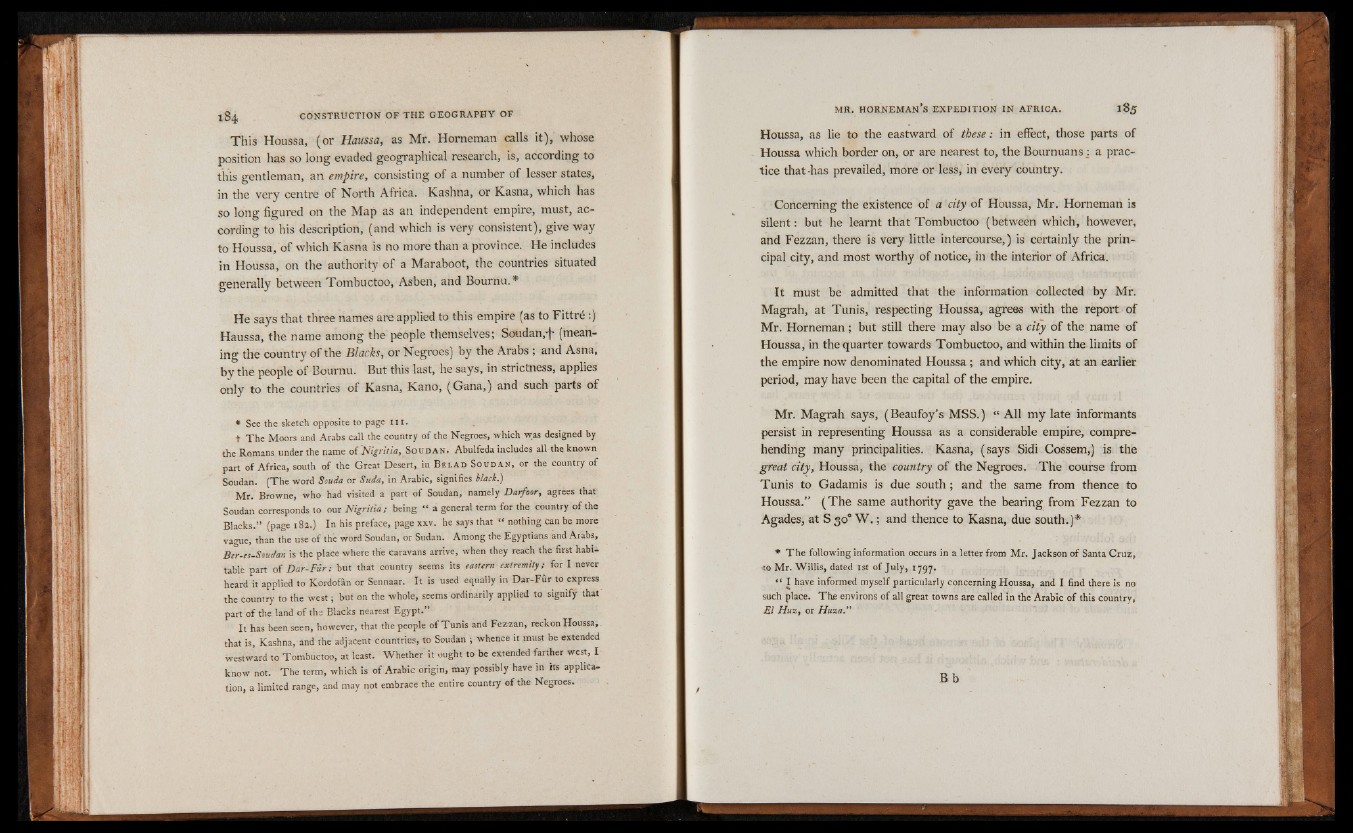
This Houssa, (or Haussa, as Mr. Horneman calls it), whose
position has so long evaded geographical research, is, according to
this gentleman, an empire, consisting of a number of lesser states,
in the very centre of North Africa. Kashna, or Kasna, which has
so long figured on the Map as an independent empire, must, according
to his description, (and which is very consistent), give way
to Houssa, of which Kasna is no more than a province. He includes
in Houssa, on the authority of a Maraboot, the countries situated
generally between Tombuctoo, Asben, and Bournu. *
He says that three names are applied to this empire (as to Fittre:)
Haussa, the name among the people themselves; Soudan,f (meaning
the country of the Blacks, or Negroes) by the Arabs ; and Asna,
by the people of Bournu. But this last, he says, in strictness, applies
only to the countries of Kasna, Kano, (Gana,) and such parts of
* See the sketch opposite to page 111.
+ Th e Moors and Arabs call the country of the Negroes, which was designed by
the Romans under the name of Nigritia, S o u d a n . Abulfeda includes all the known
part of Africa, south o f the Great Desert, in B e l a d S o u d a n , or the country of
Soudan. (The word Souda or Suda, in Arabic, signifies black.)
Mr. Browne, who had visited a part of Soudan, namely Darfoor, agrees that
Soudan corresponds to our Nigritia; being “ a general term for the country of the
Blacks.” (page 182.) In his preface, page xxv. he says that “ nothing Can be more
vague, than the use of the word Soudan, or Sudan. Among the Egyptians and Arabs,
Ber-es-Soudan is the place where the caravans arrive, when they reach the first habitable
part of Dar-Fur: but that country seems its eastern extremity; for I never
heard it applied to Kordofan or Sennaar. It is used equally in Dar-Fur to express
the country to the w e s t; but on the whole, seems ordinarily applied to signify that
part of the land of the Blacks nearest Egypt.”
It has been seen, however, that the people of Tunis and Fezzan, reckon Houssa,
that is, Kashna, and the adjacent countries, to Soudan ; whence it must be extended
westward to Tombuctoo, at least. Whether it ought to be extended farther west, I
know not. Th e term, which is of Arabic origin, may possibly have in its application,
a limited range, and may not embrace the entire country o f the Negroes.
Houssa, as lie to the eastward of these: in effect, those parts of
Houssa which border on, or are nearest to, the Bournuans : a practice
that-has prevailed, more or less, in every country.
Concerning the existence of a city of Houssa, Mr. Horneman is
silent: but he learnt that Tombuctoo (between which, however,
and Fezzan, there is very little intercourse,) is certainly the principal
city, and most worthy of notice, in the interior of Africa.
It must be admitted that the information collected by Mr.
Magrah, at Tunis, respecting Houssa, agrees with the report of
Mr. Horneman; but still there may also be a city of the name of
Houssa, in the quarter towards Tombuctoo, and within the limits of
the empire now denominated Houssa; and which city, at an earlier
period, may have been the capital of the empire.
Mr. Magrah says, (Beaufoy's MSS.) “ All my late informants
persist in representing Houssa as a considerable empire, comprehending
many principalities. Kasna, (says Sidi Cossem,) is the
great city, Houssa, the country of the Negroes. The course from
Tunis to Gadamis is due south; and the same from thence to
Houssa.” (The same authority gave the bearing from Fezzan to
Agades, at Sgo° W . ; and thence to Kasna, due south.)*
* T h e following information occurs in a letter from Mr. Jackson o f Santa Cruz,
'to Mr. Willis, dated ist of July, 1797.
“ I have informed myself particularly concerning Houssa, and I find there is no
such place. Th e environs of all great towns are called in the Arabic of this country,
E l H u z9 or Huza.”